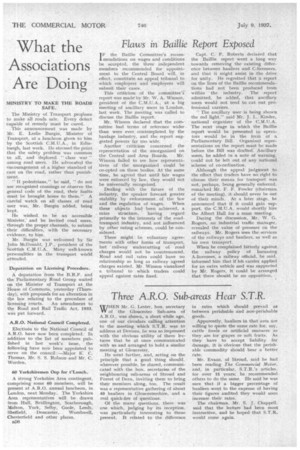Flaws in Baillie Report Exposed
Page 46

If you've noticed an error in this article please click here to report it so we can fix it.
IF the Baillie Committee's recom mendations on wages and conditions be accepted, the three independent members recommended for appointment to the Central Board will, in effect, constitute an appeal tribunal to which employers and employeeS will submit their cases.
This criticism of the committee's report was made' by Mr. W. A. Winson, president of the C.M.U.A., at a big meeting of ancillary users in London, last week. The meeting was called to discuss the Baillie report Mr. Winson declared that the committee had terms of reference wider than were ever contemplated by the haulage industry, and the report sug gested powers far too wide. • Another criticism concerned the representation of the unorganized on the Central and Area Boards. Mr. Willson failed to see how representatives of the unorganized could be co-opted on these bodies. At the same time, he agreed that until fair wages were enforced by law, they would not be universally recognized.
Dealing with the future of the industry, the speaker forecast greater stability by enforcement_ of the law and the regulation of wages. When these objects had been achieved, a rates structure, having regard primarily to the interests of the roadtransport industry, and not influenced by other rating schemes, could be considered.
There might be voluntary agreements with other forms of transport, but railway undercutting. of road charges would not be countenanced. Road and rail rates could have no relationship so long as railway agreed charges existed. Mr. Winson visualized a tribunal to which traders could appeal against rates fixed. Capt. C. F. Roberts declared that the Baillie report went a long way towards removing theexisting difference between hauliers and C-licensees, and that it .might assist in the drive for unity. He regretted that a report on the lines of the Baillie recommendations had not been produced from
within • the indostry. The report admitted, he added, that ancillary users would not tend to cut out professional carriers.
" The ancillary user is being shown, the red light," said Mr. J. L. Kinder, national organizer of the C.M.11.A. The next stage in which the Baillie report would be presented to operators would be in the form of a Parliamentary Bill. Organized representations on the report must be made before the Bill was drafted. Ancillary users, he added in a note of warning, could not be left out, of any national scheme of co-ordination.
Although the appeal judgment to the effect that traders have no right to choose their means for transport was not, perhaps, being generally enforced, remarked Mr. F. F. Fowler (chairman of the meeting), it should never he out of their minds. At a later stage, he announced that if it could gain support, the C,M.U.A, would shortly hire the Albert Hall for a mass meeting.
During the discussion, Mr. W. G. Rogers, an industrial traffic manager, revealed the value of pressure on the railways. Mr. Rogers uses the services of the railways and hauliers, as well as his own transport.
When he complained bitterly against the railway policy of harassing A-licensees; a railway official, he said, informed him that if his carrier applied for an extra vehicle and was supported by Mr. Rogers, it could be arranged that there should be no opposition.




















































































